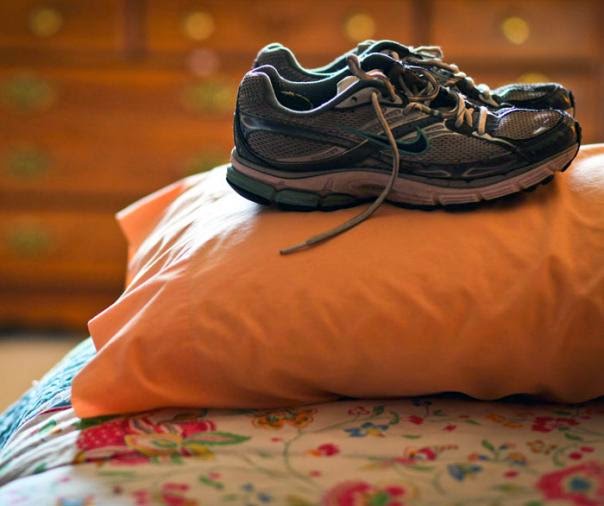 |
| Image courtesy Etandel. |
"People sleep significantly better and feel more alert during the day if they get at least 150 minutes of exercise a week, a new study concludes."
What kind of improvement are they boasting? A 65 percent increase in sleep quality. That's no small thing, given how tired Americans are.
That boils down to 20-25 minutes a day of your favorite exercise, the equivalent of a brisk indoor or outdoor walk daily, or 3 days at the gym or pool or elsewhere for 50 minutes. And it doesn't haven't to include exercise in the formal sense, it could be some heavy lifting out in the yard, or your lunchtime walkabout during the week, or a dip in the pool with your kids on the weekend, or a challenging yoga class, or a night at the community center playing volleyball.
The idea is pretty simple: cardiovascular activity sharpens one's focus, improves daytime productivity and eliminates daytime sleepiness as well as leads to easier sleep onset at night and more restful sleep overall.
Perhaps the best way to look at it is this statement from the NSF: "“Increasingly, the scientific evidence is encouraging as regular physical activity may serve as a non-pharmaceutical alternative to improve sleep.”
If you could replace your sleeping pills with a brisk daily walk to prevent insomnia, wouldn't you?
Some tips for making exercise work for your sleep habits:
1. Reconsider exercise right before bedtime. Exercise releases hormones such as adrenaline (epinephrine) and cortisol, which will lead to extended wakefulness following the workout. Try to put three hours between the end of your workout and bedtime, if you are able.
2. That said, some people can exercise right before bed and not suffer from delayed sleep onset. In fact, this might be the only time some people CAN get their exercise. If you aren't sure how it will affect you, keep a sleep diary that captures how long it takes for you to fall asleep on nights when you've been visited with insomnia. You can also swap muscle-building exercises for high intensity aerobics activities in order to ease into sleep more smoothly.
3. Keep an exercise routine to help establish good sleep patterns overall. Your body likes regularity... in exercise, sleeping, eating... more regularity means less stress.
4. Exercise in the morning outside is the optimal opportunity to not only get your sleep-worthy exercise, but to also re-entrain your brain to daylight, thereby giving your circadian rhythms a boost.
5. Focus on your breathing as you exercise, and try to find a pattern you can stick with comfortably. The respiratory boost of mild exercise can be an excellent way to instill calm in the body afterward.
6. If you shower afterward, try not to use overly hot water if you are heading off to bed. Your body needs a cool down at bedtime if it is going to fall asleep. Keep your shower warm, then follow with a glass of cold water. Sleep in a cool room with layers of blankets you can adjust so as not to be overwarm.
SOURCES
- CNN: Can exercising at night hurt your sleep?
- Mental Health and Physical Activity: Association between objectively-measured physical activity and sleep, NHANES 2005–2006
- National Sleep Foundation: Study: Physical Activity Impacts Overall Quality of Sleep
A friendly reminder that links to websites offering products does not imply endorsement by SleepyHeadCENTRAL.com.
SleepyHeadCENTRAL strongly encourages people with ongoing sleep health problems to approach a medical professional to determine appropriate differential diagnoses and treatment. This post, like all other posts on SHC, is not intended to substitute for medical advice.

